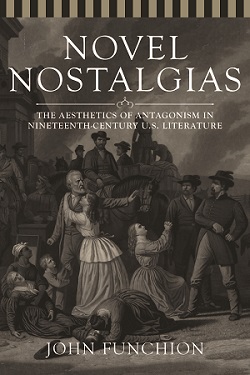Novel NostalgiasThe Aesthetics of Antagonism in Nineteenth-Century U.S. LiteratureJohn Funchion |
 8/19/2015 LITERARY CRITICISM / General; LITERARY CRITICISM / American / General 304 pp. 6x9  $39.95 paper 978-0-8142-5217-8 Add paper to shopping cart $39.95 PDF eBook 978-0-8142-7525-2 Add PDF eBook to shopping cart Shopping Cart Instructions Review/Change Shopping Cart & Check-out | |||
|
Explore More Disagreement: Politics and Philosophy by Jacques Rancière American Literature’s Aesthetic Dimensions, edited by Cindy Weinstein and Christopher Looby Mapping Region in Early American Writing, edited by Edward Watts, Keri Holt, and John Funchion |
“What John Funchion has provided with Novel Nostalgias is a total re-imagining of the nineteenth century and a very welcome and persuasive attempt to historicize the nostalgia and to thus get at the extraordinary way that affects themselves have worked to make other histories and futures possible in a given period. The scholarship is—in a word—incredible.” —Stephanie Foote, University of Illinois at Urbana–Champaign Novel Nostalgias: The Aesthetics of Antagonism in Nineteenth-Century U.S. Literature establishes how the longing to recover a lost home or past drove some of the central conflicts of the nineteenth-century United States. Providing one of the few U.S. literary histories that examines cultural material from both before and after the Civil War, John Funchion argues that a diverse array of novels, from William Wells Brown’s Clotel to L. Frank Baum’s The Wonderful Wizard of Oz, imagined new politically—and antagonistically—charged communities through forms of nostalgic longing. In contrast with studies that characterized the nineteenth-century U.S. novel as a consensus-generating form complicit with disciplinary culture, Funchion shows how novels shaped a series of culture wars by advancing antagonistic nostalgias. Southern slave owners and their slaves or industrial magnates and their union opponents alike enlisted the power of nostalgia to validate their rival visions of the nation as lost moments awaiting recovery. Antagonistic nostalgias legitimated the political claims of movements as diverse as abolitionism, sectionalism, populism, socialism, anarchism, and cosmopolitanism. Novel Nostalgias provides a deep cultural historical understanding of the nineteenth-century United States, but ultimately, it also allows for a better understanding of how twenty-first-century movements function.
| |||
9780814212875


 John Funchion
John Funchion